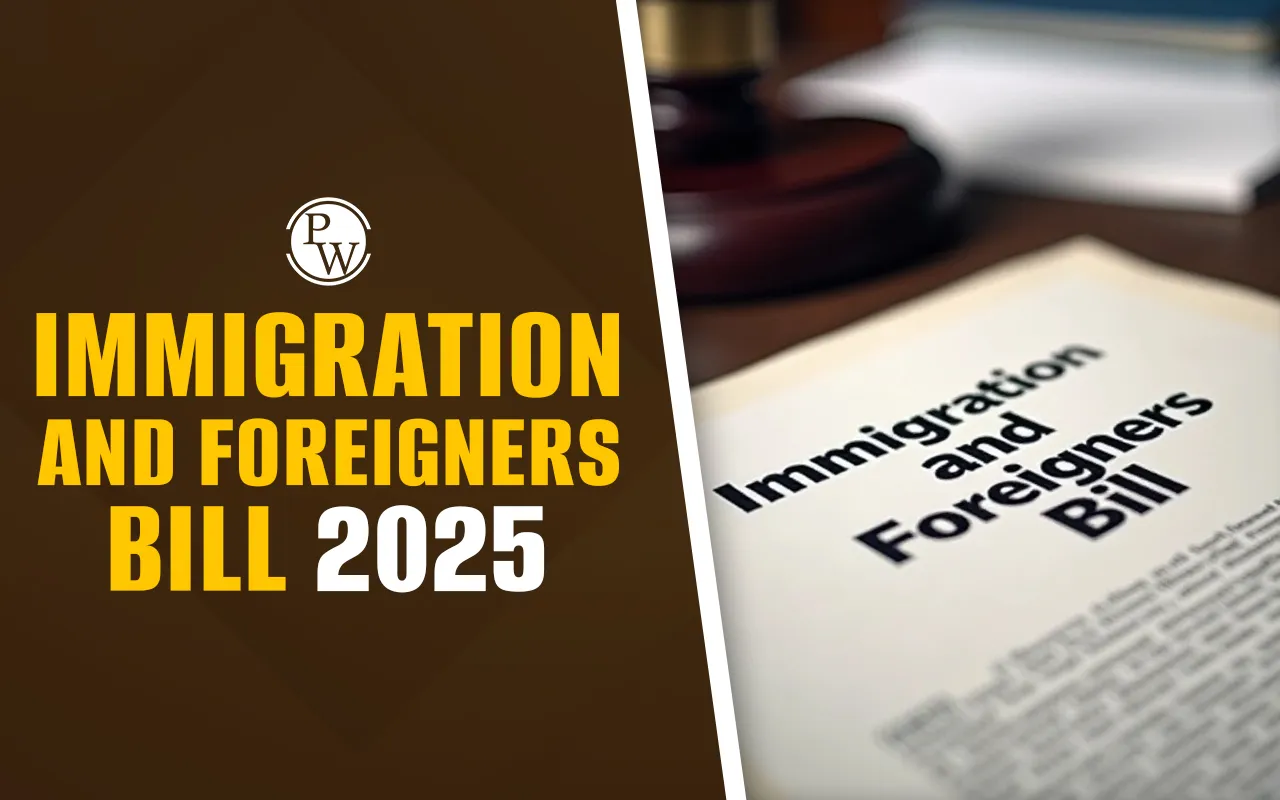
Immigration and Foreigners Bill 2025, a legislative reform to address the issue of immigration, entry, and stay of foreigners has been passed by the Indian Parliament. It repealed four outdated laws: the Passport (Entry into India) Act, 1920; the Registration of Foreigners Act, 1939; the Foreigners Act, 1946; and the Immigration (Carriers’ Liability) Act, 2000. Learn key provisions of the Immigration and Foreigners Bill 2025 here.
The Immigration and Foreigners Bill 2025 is a major legislative reform that aims to modernise India’s immigration laws. It replaces four outdated acts and proposes a structured way to regulate the entry, stay, and exit of foreigners in India. This new Bill is an effort to align India’s immigration framework with global best practices.
The existing laws like the Foreigners Act, 1946, and the Passport Act, 1920 are no longer suitable for present challenges such as illegal immigration, national security, and international mobility. In addition to that, the bill seeks to:
Streamline visa system
Establish a Bureau of Immigration
Proposes National Immigration Authority (NIA)
Mandates the Integrated Immigration Management System (IIMS)
Stringent penalties for immigration violations
Immigration means the act of moving to a country to live there permanently or for a long time. People immigrate for better job opportunities, education, safety, or family reunification. Every country sets its own immigration laws to regulate who can enter, for how long, and under what conditions.
India has seen different types of immigration—legal, illegal, economic migration, and refugee movement. With changing global and regional politics, regulating immigration becomes a crucial task. The Immigration and Foreigners Bill 2025 is India’s response to growing concerns about undocumented foreigners, national security threats, and pressure on local resources.
The main aim of the Immigration and Foreigners Bill 2025 is to manage the entry and stay of foreigners in India in a transparent and lawful way. It intends to fix the loopholes in existing laws and introduce a centralised digital system. Let’s explore the key objectives:
To modernise India’s immigration laws and replace outdated acts with a single comprehensive law.
To ensure national security by tracking undocumented foreigners and controlling illegal immigration.
To introduce an Integrated Immigration Portal that helps authorities at the national and state levels.
To create a proper database of all foreigners entering or living in India for better monitoring.
To lay down clear definitions and categories like tourists, immigrants, refugees, and asylum seekers.
To promote ease of travel and trade by simplifying visa and entry procedures for genuine travellers.
To coordinate with international immigration standards and agreements signed by India.
Here are some of the key features of the new Immigration and Foreigners Bill 2025:
Modernize Immigration Laws: Repeals four existing laws including the Passport Act, 1920, Registration of Foreigners Act 1939, Foreigners Act 1946, and Immigration (Carriers’ Liability) Act, 2000.
Visa & Documentation: Foreigners entering or leaving India must have a valid visa along with a passport or other approved travel documents. New visa categories include Business Visa Plus, Startup Visa, Skilled Talent Visa, and Investor Visa.
Bureau of Immigration: A new Bureau of Immigration will handle all immigration-related tasks, such as visa issuance and regulating foreigners' entry, stay, and exit. It will be overseen by a Commissioner appointed by the government.
Registration Requirement: Foreign nationals must register with the Foreigners Regional Registration Office (FRRO) within 14 days of arrival if staying beyond 180 days, streamlining monitoring during their stay.
Information Sharing: Carriers (airlines, ships, etc.) must provide details of passengers and crew to authorities. Educational and medical institutions are also required to report foreign students and patients.
Expanded Carrier Definition: The Bill expands the definition of "carrier" to include all modes of transport—air, sea, and land—and requires transport operators to get clearance from immigration before departure.
Departure Clearance: No vehicle (aircraft, ship, etc.) can leave India without immigration clearance, ensuring proper documentation is in place before departure.
Tougher Penalties: Violations, such as entering without valid documents, now carry harsher penalties, including up to five years in prison and a fine of up to five lakh rupees.
Arrest Powers: Police officers with at least the rank of Head Constable can now arrest individuals entering India without proper documents, without needing a warrant.
The implications of the Immigration and Foreigners Bill 2025 affect national policy, individual rights, and even India’s relations with neighbouring countries. Here are some of the major implications of this new bill:
Better Border Control: It will help in identifying and managing illegal immigrants, especially in sensitive regions like Assam and Jammu & Kashmir.
Digital Governance: The use of digital tools like biometrics and portals will reduce paperwork and delay.
Cooperation Between Centre and States: Shared access to immigration databases will ensure smooth functioning.
Boost to Tourism and Trade: A clear and fast process will encourage foreign tourists, investors, and professionals.
Improved National Security: Real-time tracking will help intelligence agencies prevent misuse of Indian soil.
Data Privacy: Collecting biometric and travel data may raise privacy concerns if not protected properly.
Human Rights Issues: Deportation of refugees without fair hearings can draw criticism from global human rights bodies.
Federal Disputes: States may oppose central control, especially in politically sensitive areas like North-East India.
Implementation Gap: Lack of infrastructure and trained officers in border districts may cause delays and errors.
Burden on Judiciary: Immigration tribunals may get overloaded with appeals if not managed well.
To sum up, the Immigration and Foreigners Bill 2025 is a timely reform to regulate the complex issue of immigration in India. It promises legal clarity, security, and a smooth digital process. However, success depends on how well it is implemented with safeguards.
Want to stay updated with such critical laws for UPSC? Explore PW UPSC Courses and strengthen your preparation with guidance and real-time updates!
| Related Post | ||
| UPSC CSAT Online Coaching | UPSC Syllabus 2025 | UPSC CSAT 2025 |
| UPSC Syllabus In Hindi | UPSC Previous Year Question Paper | UPSC CSAT Formula |
